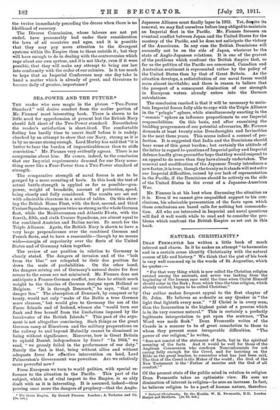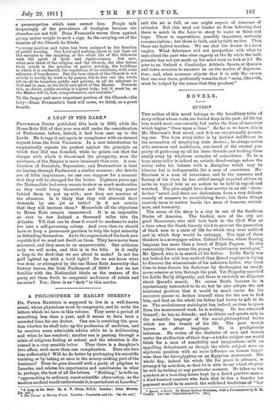NATURAL CHRISTIANITY.*
DEAN FREMANTLE has written a little book of much interest and charm. In it he makes an attempt " to harmonize
and in a certain sense identify Christianity with the natural course of life and history." We think that the gist of his book is very well summed up in the words of St. Augustine, which he quotes :-
" For that very thing which is now called the Christian religion existed among the ancient's, and never was lacking from the beginning of the human race until the time when Christ Himself should come in the flesh ; from which time the true religion, which already existed, began to be called Christian."
Our author makes frequent appeal to the first chapter of St. John. He believes as ardently as any Quaker in " the light that lighteth every man." "If Christ is in every man, then the Incarnation is the highest point of a process which is in its very essence natural." This is certainly a perfectly legitimate interpretation to put upon the sentence, "The
Word was made flesh." Dean Fremantle writes of the Creeds in a manner to be of great consolation to those to whom they present some insuperable difficulties. "The power of our religion," he writes,
"does not consist of the statement of facts, but in the spiritual meaning of the facts. And it would be well for those of the Anglican Communion who condemn Nonconformists for not caring fully enough for the Creed, and for insisting on the Bible as the great teacher, to remember what has just been said, The God of the Creed is the Maker of the world ; the God of the New Testament is the • Father of mercies and the God of all comfort."
Of the present state of the public mind in relation to religion Dean Fremantle takes an optimistic view. He sees no diminution of interest in religion—he sees an increase. In fact, he believes religion to be a part of human nature, therefore
• Natural Christianity. By the Houble. W. H. Fremantle, D.D. London Harper and Brothers. [2s. 6d. net.]
a preoccupation which man cannot lose. People talk desparingly of the prevalence of irreligion because the churches are not full. Dean Fremantle warns them against giving undue weight to such a sign. In the carrying out of the mission of the Church he thinks
"a wrong position and value has been assigned to the function of public worship. Our Lord said nothing about it, but bent all His energies to the inspiring of the whole life of His followers with the spirit of faith and righteousness. But now, when men think of the religion and the Church, the idea before their minds is the practice of public worship, the buildings in which it is conducted, the regulation of its ministers, with some adjuncts of beneficence. But the true object of the Church is not merely to testify by word or by prayer, but to live out the whole life in all its branches, public and private, in all its relations to God and to man, in the faith and spirit of the Master. Towards this, no doubt, public worship is a great help ; but it must be, as the Master left it, free, comprehensive, and mutable."
To the larger and more important portion of the Churchthe laity—Dean Fremantle's book will come, we think, as a great benefit.







































 Previous page
Previous page